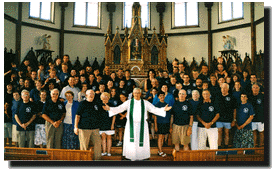Knowledge of the history of one’s family creates a connection between the present and the past, between young people and seniors, and between communities—whether they are on the same island or on different continents. Family histories can contextualize the evolution of technology and humanize political changes and social upheavals. In short, family histories remind us that we are affected by these global changes, reminding us of our place in the world.
Root meanings
Genealogy and family histories have
become more popular in recent years as people eager to
find more meaning in their daily lives seek to connect
with their cultural heritage and their family’s
history. Many Canadians and Americans are discovering
among their ancestors Prince Edward Islanders who had
moved to Ontario or Western Canada or the New England
States to find their fortune. Prince Edward Island and
the other Atlantic Canadian provinces are also a
stepping-stone for North Americans to trace their
ancestral roots especially in France or the British
Isles.
What is in a name?
“Who’s your father?”
It is an often-asked question when two Islanders meet for
the first time. In small Island communities, knowing who
someone’s parents and grandparents are can be the
most important identifier for interpersonal recognition,
especially between younger and older generations.
Similarly, tagging on the names of parents also helps to
distinguish between community members of the same name.
For example, two John  MacDonalds
would be differentiated according to their fathers’
names, one being John-Angus (or John-of-Angus) and the
other John-Francis. A last name can also indicate a
family’s religion and geographic origins. Having
determined a name, one might safely guess at a
family’s economic background or occupation. For
example, a person by the name of Arsenault might
reasonably be expected to be a descendant from Acadian
fishing families in Prince County.
MacDonalds
would be differentiated according to their fathers’
names, one being John-Angus (or John-of-Angus) and the
other John-Francis. A last name can also indicate a
family’s religion and geographic origins. Having
determined a name, one might safely guess at a
family’s economic background or occupation. For
example, a person by the name of Arsenault might
reasonably be expected to be a descendant from Acadian
fishing families in Prince County.
Going to the chapel...
Family lineage plays an important role in
marriage on the Island. Historically, couples desiring to
be married in the Catholic Church were required to reveal
their lineage before they could be wed. For example, when
a widow or widower wished to enter a second marriage,
priests were obliged to investigate the possibility of
blood ties between the first spouse and the intended
second spouse. If the two were related, the couple
required dispensation before a marriage could be
performed. Similarly, engaged couples were required to
trace their ancestry back four generations to their
great-great-grandparents. Marriages between fourth degree
relations (third cousins) or closer relatives would
require dispensation. In one case, after a marriage
ceremony had been performed, the priest discovered that
the couple might be related by blood. He quickly made his
way to the reception and forbade the couple to consummate
their union until he could have the bishop grant the
marriage a dispensation.
A generation a day keeps the doctor away...
Above and beyond people’s interest in
family heritage and cultural roots, a knowledge of family
history has become more and more important for health
reasons. Growth in the awareness and understanding of
genetic disease has made family history virtually a vital
statistic. The Isaac Walton Killam (I.W.K.) Hospital in
Halifax, Nova Scotia, is proof of this. The I.W.K. has
its own genealogy department that researches family
histories in order to find out the possible background on
patients’ diseases.
Each year, thousands people from around the world come to Prince Edward Island to trace their family roots. On-line computerized documents, public archives, land registry offices, and genealogy libraries are open to all who wish to conduct their own research. Moreover, in recent years, much work has been done on the history of certain Island families, thus making the genealogist’s work much easier.

